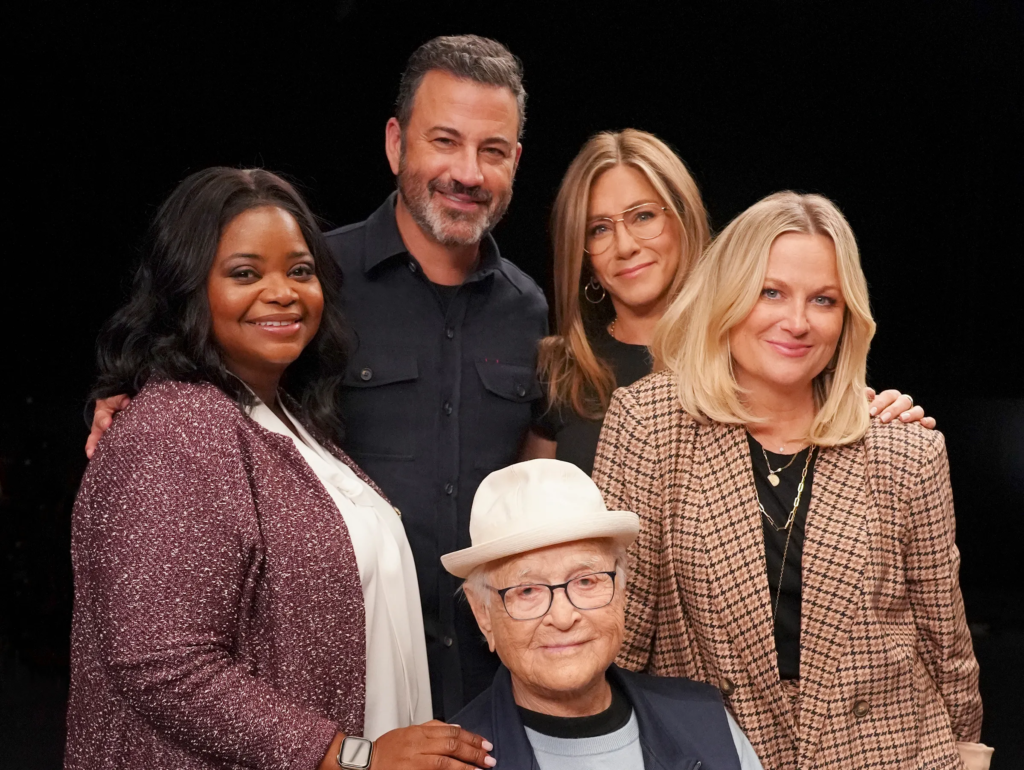Renowned television visionary Norman Lear, celebrated for transforming American prime-time comedy, has passed away at 101. His family confirmed his passing, marking the end of a remarkable career spanning over six decades. Norman Lear
Lear’s impact on TV was monumental, shaping the 1970s comedy landscape with iconic shows like “All in the Family,” “Maude,” “Good Times,” and “The Jeffersons.” These series fearlessly tackled societal issues, confronting racism, sexism, war, and cultural differences head-on, challenging both TV networks and audiences.

Among Lear’s creations, “All in the Family” stood out, featuring the unforgettable character Archie Bunker. Despite Archie’s backward views, he struck a chord with millions, symbolizing an era. Lear once reflected that despite his flaws, Archie had a deep love for his country and family, adding a nuanced layer to the character’s hypothetical political beliefs.
Throughout his career, Lear received numerous awards, including six Emmys, induction into the Television Academy Hall of Fame, a Peabody Lifetime Achievement Award, and the esteemed Carol Burnett Award for lifetime achievement in 2021.

In the late 1980s, Lear ventured into film production, collaborating with director Rob Reiner on acclaimed movies like “The Sure Thing,” “Stand by Me,” and “The Princess Bride.” Despite facing challenges in the 1990s, Lear remained resilient, contributing to various entertainment, political, and educational endeavors.
Norman Lear was a trailblazing figure in American television, credited with revolutionizing the landscape of prime-time comedy. Born on July 27, 1922, in New Haven, Connecticut, Lear’s journey to becoming a television legend was marked by creativity, innovation, and a commitment to pushing boundaries.
He began his career in the entertainment industry writing comedy for radio, gradually transitioning to television. Lear’s breakthrough moment came in the 1970s with the creation of “All in the Family,” a show that challenged societal norms and brought forth contentious issues in a humorous yet thought-provoking manner.
The character of Archie Bunker, played by Carroll O’Connor, became an iconic figure, representing a slice of American society grappling with changing values. Lear’s ability to infuse humor into serious topics like racism, sexism, and politics was groundbreaking, earning the show critical acclaim and a devoted fan base.

Beyond “All in the Family,” Lear’s influence extended to several other hit shows like “Maude,” “Good Times,” and “The Jeffersons,” each addressing pertinent social issues of the time.
Lear’s impact wasn’t confined to television alone. In the late 1980s, he ventured into film production, collaborating with renowned directors like Rob Reiner on successful movies that further solidified his reputation as a creative force in entertainment.
His legacy goes beyond entertainment. Lear was actively involved in political and social activism, using his platform to advocate for causes he believed in. His contributions to education and philanthropy underscored his commitment to making a meaningful impact beyond the entertainment realm.
Throughout his life, Lear accumulated a multitude of awards and honors for his contributions to the industry, cementing his status as a visionary and a pioneer in American television.
Norman Lear’s passing at the age of 101 marked the end of an era, but his enduring legacy continues to shape the entertainment landscape and inspire future creators to fearlessly address societal issues through their art.
Norman Lear’s legacy as a pioneer in television comedy is marked by his groundbreaking contributions that reshaped the landscape of American entertainment. Born on July 27, 1922, Lear’s impact on the industry spans decades, leaving an indelible mark on both television and societal perceptions.
His most iconic creation, “All in the Family,” premiered in 1971 and revolutionized television. The show confronted prevalent social issues through the lens of the Bunker family, led by the memorable character Archie Bunker. Played by Carroll O’Connor, Archie became a symbol of a changing America, portraying the conflicts and tensions of the era.
Lear fearlessly tackled taboo subjects—racism, sexism, politics, and more—in a format that blended humor with poignant social commentary. The show’s success opened doors for other groundbreaking productions like “Maude,” “Good Times,” and “The Jeffersons,” each pushing boundaries and reflecting the realities of American life.

Beyond his role as a creator, Lear’s legacy extended into advocacy. He used his platform to advocate for progressive causes and encourage dialogue on contentious issues. Lear’s impact resonated not just within the entertainment industry but also in society, as his shows sparked conversations and challenged prevailing attitudes.
His contributions earned him numerous awards and recognition, including multiple Emmys, induction into the Television Academy Hall of Fame, and a Peabody Lifetime Achievement Award. Lear’s commitment to pushing the boundaries of comedy while addressing societal issues cemented his status as a television visionary, leaving an enduring legacy that continues to influence creators and audiences alike.
Norman Lear’s groundbreaking impact on television comedy stems from his fearless approach to addressing societal issues through the medium of entertainment. Born in 1922, Lear’s journey in the industry began in the 1950s, writing for comedies and variety shows. However, it was in the 1970s that he truly revolutionized the landscape with his iconic creation, “All in the Family.”
The show was a watershed moment, introducing audiences to Archie Bunker, a character whose opinions often clashed with the evolving social norms of the time. Portrayed by Carroll O’Connor, Bunker became a symbol of resistance to change, while also offering moments of introspection that endeared him to viewers.
Lear’s genius lay in his ability to infuse humor into sensitive topics like racism, sexism, and politics, sparking conversations across American households. The success of “All in the Family” paved the way for a string of socially relevant sitcoms like “Maude,” addressing feminism and women’s rights, and “The Jeffersons,” exploring issues of race and class.
His impact transcended the confines of the television screen. Lear used his platform to champion causes he believed in, becoming a vocal advocate for progressive change. His commitment to social justice extended beyond entertainment, contributing to philanthropy and political activism.
Despite facing resistance from network executives and conservative viewers, Lear’s persistence in presenting complex societal issues through comedy earned him accolades, including multiple Emmy Awards and induction into prestigious halls of fame.
Beyond his television success, Lear delved into film production, collaborating with notable directors on acclaimed movies that further solidified his reputation as a creative force.
Norman Lear’s legacy isn’t just about laughter; it’s a testament to the power of entertainment in shaping perceptions and challenging societal norms, leaving an indelible mark on both television and American culture.











